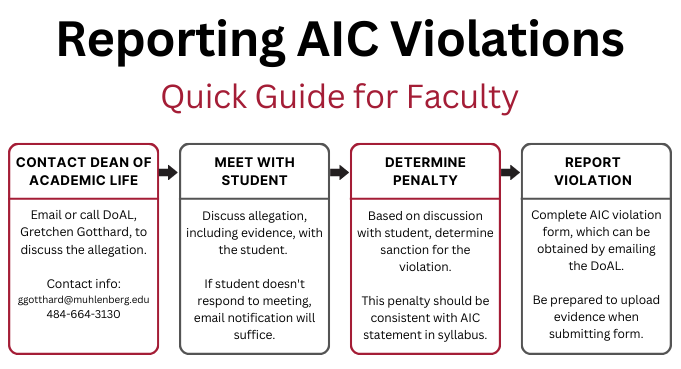Academic Integrity Code
The Academic Integrity Code (AIC) is a communal expression of the importance of academic honesty and integrity. The AIC, to which all Muhlenberg community members subscribe, governs academic activities, including all methods for evaluating academic achievement (e.g., exams, quizzes, papers, recitations and laboratory exercises, and other assignments). Students should familiarize themselves fully with the AIC and confer with their instructors when they have questions about how the AIC applies to work in their courses.
Important Resource for Students - Defining Plagiarism
Why is academic integrity important?
As an academic community devoted to the discovery and dissemination of truth, Muhlenberg College insists that its students conduct themselves honestly in all academic activities. Muhlenberg College has established these standards of academic conduct because of its belief that academic honesty is a matter of individual and College responsibility and that when standards of honesty are violated, each member of the community is harmed. Therefore, each student, as a prerequisite for matriculation, must pledge to adhere to the provisions of this Academic Integrity Code thereby accepting a share of the responsibility for maintaining the College's standards of academic integrity.
What constitutes an AIC violation?
- Cheating: Looking at another student's work; communicating with another student in any manner during an assessment; using any unauthorized materials (e.g., cell phone, laptop, notes, books, etc); or engaging in any other activity for the purpose of seeking aid not authorized by the instructor. This includes all forms of assigned work (e.g., quizzes/tests, homework, projects, labs, etc.).
- Plagiarism: Intentional or unintentional copying from a book, article, notebook, or other paper or electronic source material whether published or unpublished, without giving proper credit through the standard use of quotation marks, footnotes, and other customary means of identifying sources, or passing off as one's own the ideas, words, writings, and experiments of another. Plagiarism shall also include submitting without the consent of the professor an assignment already tendered for academic credit in another course.
- Collusion: Working together in preparing separate assignments in ways not authorized by the instructor. Academic work produced through a cooperative effort of two or more students is permissible only upon the explicit consent of the instructor. The collaboration must also be acknowledged in stating the authorship of the assignment.
- False Information: Furnishing false or misleading information to the College (including advisors, registrar, faculty, or any other College official) for the purpose of obtaining special consideration or privilege (e.g., postponement of an exam or a deadline for an assignment); in connection with any actual, alleged, or suspected violation of the Academic Integrity Code; and/or in connection with any hearing before the Academic Judicial Board (AJB).
- Helping or Hindering Others: Engaging in any activity not authorized by the instructor which helps or hinders another in any work being submitted for a grade. In the event that a student is found guilty of helping or hindering others in a course in which the first student is not enrolled, the penalty shall be a notation of the offense placed in the student's Permanent Record.
What should I do if I witness an AIC violation?
You should contact the instructor of the course and explain your concerns. If you’re unsure who the instructor is, please reach out to the Dean of Academic Life ([email protected] or 484-664-3130).
What happens if I am charged with an AIC violation?
- Your instructor will contact you to discuss the allegation. If they believe there is sufficient evidence to submit an AIC violation, they will complete a form that goes to the Dean of Academic Life.
- You will then be contacted by the office of the Dean of Academic Life to schedule a meeting with the Dean. During this meeting, the Dean will discuss the allegation with you, explain your rights (see below for more details), and answer your questions.
What kinds of sanctions (penalties) are common with AIC violations?
- The faculty member is responsible for selecting the appropriate sanction for a violation. If the case goes to an Academic Judicial Board hearing, the Board and/or Dean of Academic Life may recommend an alternative sanction.
- 1st offense examples: Grade of F on the assignment, 0 points on the assignment, F for the course, or VF for the course (VF: grade of F due to a violation)
- 2nd (or 3rd offense) examples: VF for the course or dismissal from the College
What are my rights in the AIC violation process?
- 1st offense: You may accept the sanction or you may appeal the decision. Appealing the decision requires an Academic Judicial Board (AJB) hearing.
- 2nd offense: You are required to participate in an AJB hearing.
What happens during an AJB hearing?
The Academic Judicial Board (AJB) consists of faculty, staff, and student members. Prior to the hearing, the student is provided with a judicial advisor who helps them prepare for the hearing. During the hearing, the student has the opportunity to make an opening statement to explain their perspective on the allegation, the faculty member also makes an opening statement. The AJB then asks questions of both the student and the faculty member. When questioning is complete, the student, judicial advisor, and faculty member leave the room so the AJB can deliberate. An official decision is relayed to the student by the Dean of Academic Life.
How can I prevent AIC violations in my work?
Talk to your instructor. Their syllabus will include statements about the AIC and how it applies to work in their class. If you are confused about how the AIC applies to work in a class, reach out to your instructor and ask for clarification. Resources through the Writing Center and the Academic Resource Center are also available to support your academic integrity.

